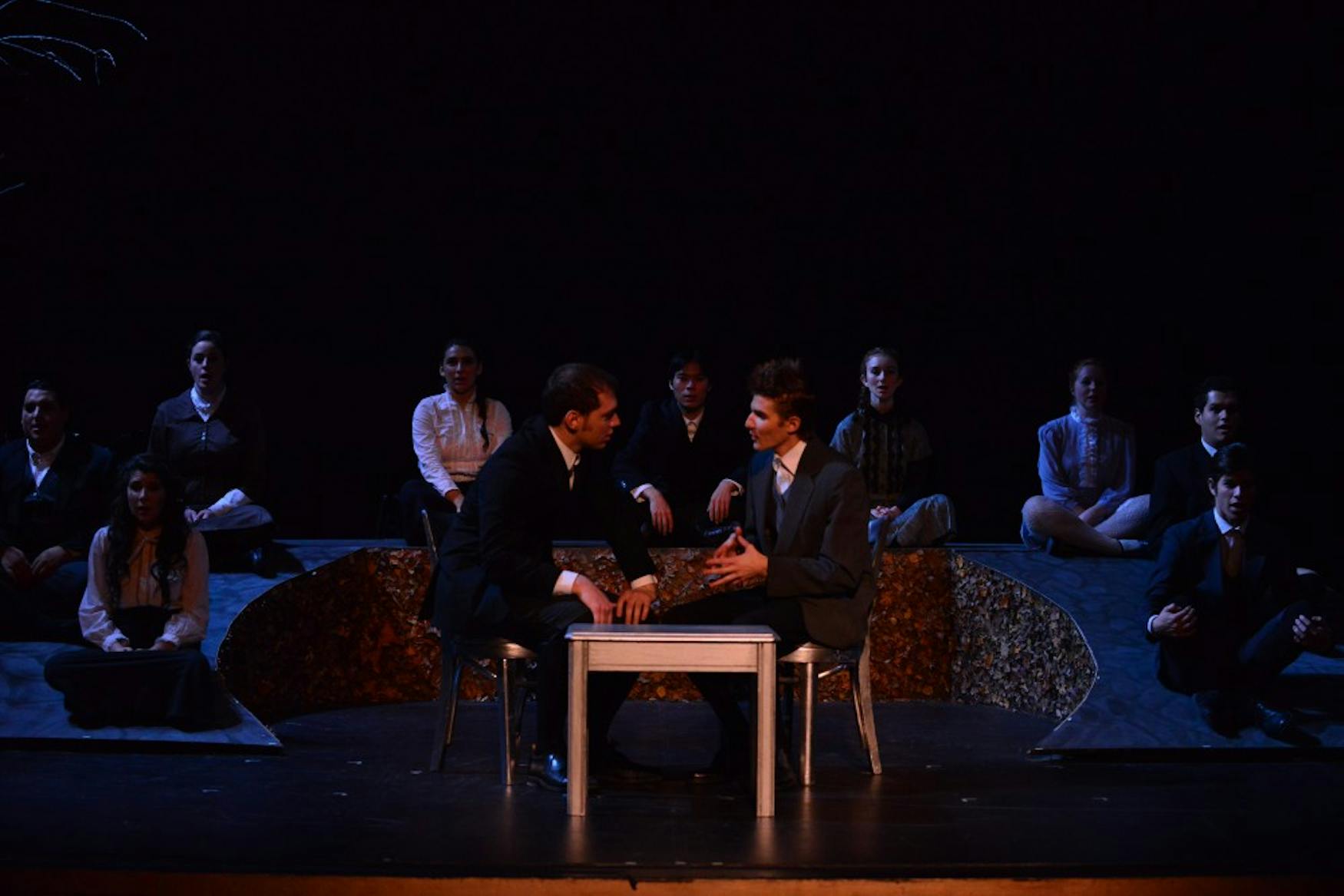'Spring Awakening' engages in taboos
Many people associate musicals with random dance numbers, toned-down dialogue and happily-ever-afters. Brandeis’ latest musical challenges this assumption, touching on sensitive issues like sex education and abortion overs its two acts. Tympanium Euphorium’s production of Spring Awakening debuted on Thursday evening in the Carl J. Shapiro Theater. The show was directed by Rachel Liff ’16 and stage-managed by Rachel Josselsohn ’17. It focused on two German teenagers, Melchior Gabor (Jason Theoharis ’17) and Wendla Bergmann (Sarah Steiker ’17), who break the rules of their restrictive society. The show’s program bills it as a play about “everything we don’t talk about,” which is pretty accurate. Featuring sex, abortion and corruption, the play highlighted the darker parts of German society in the late 1890s. The production appeared to be cognizant of this fact and included a resource guide for sexual assault survivors and bystanders in its playbill.
The Brandeis ticket booth reported sold-out shows for Friday and Saturday night, and even the Saturday matinee show opened to a mostly-full house.
The production featured an innovative set and an on-stage orchestra. The set consisted of a U-shaped ramp bordered by two life-sized trees. The trees were made of actual branches that were propped up and tied together, which made the set appear more realistic. The orchestra, directed by music director Alex Faye ’15, complicated this sense of realism; its unusual presence onstage almost broke the fourth wall and reminded the audience that what they were watching was merely fiction. In a way, however, this worked to the play’s advantage.
Theater critics often mention how the idea that an audience is meant to sit and passively witness a story is becoming outdated. Moving the orchestra pit onstage helped the musical engage the audience by allowing them to see exactly how much effort was involved in creating the play’s songs. This made the audience feel more like they were involved with the production and less like they were passive witnesses to it.
The play dealt with many serious themes such as abuse and identity, but it definitely had its funny moments. At one point, one of Melchior’s friends, Hanschen (Jason Teng ’17) was sitting in a chair miming masturbation so energetically that he accidentally knocked over his chair and fell backwards. Although this happened in the middle of a song, the actors dealt with the disturbance professionally and kept singing.
Another funny moment was when Hanschen and his friend Ernst (Rodrigo Alfaro Garcia-Gonzalez ’18) agreed to meet in a clearing where Hanschen surprised Ernst by kissing him. After the kiss, Ernst pulled away wearing a look of complete confusion that was almost comical. This comedy softened the otherwise pivotal and significant moment in the characters’ lives.
One of the play’s most captivating scenes happened while the cast sang about how Melchior’s actions put him in a position where he could not escape punishment. The song, titled “Totally F*cked,” had the actors singing, yelling and eventually jumping off the edge of the stage. The performers ran up and down the theater aisles, singing and jumping to the music. They eventually made their way to the space between the first row of the audience and the stage and finished the song with their middle fingers raised. The actors’ desperation, as expressed by their constant movement and loud singing, was infectious and drew the audience into their performance.
In the following scene, Melchior’s friends made offhand remarks about how he was expelled from school. The comment was made casually, as if Melchior’s friends barely cared about this misfortune. This caused the audience to sympathize more with Melchior as he faced abandonment by his family and by his friends.
Many of the play’s best songs were full-cast songs. “Totally F*cked” and the play’s final song, “The Song of Purple Summer,” followed this pattern. “The Song of Purple Summer” drew the whole cast to the front of the stage, where they summarized the various events that had occurred over the year. The play’s storylines were very specific and individualized, so it was a nice change to see the whole cast together. These moments also helped the audience make connections between characters and reminded the audience of how the characters related to each other.
As the Saturday matinee show ended, the cast received a standing ovation from the crowd. The production’s innovative use of music and its complicated dance choreography helped add new dimensions to the musical. In a play that has been performed for over a decade, these new additions, coupled with the well-executed full-cast scenes and scenes of comedic relief, helped keep the show relevant.



Please note All comments are eligible for publication in The Justice.